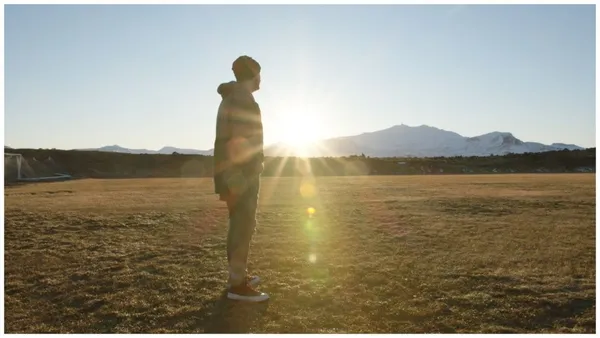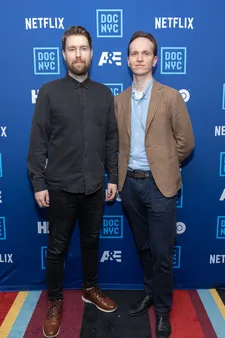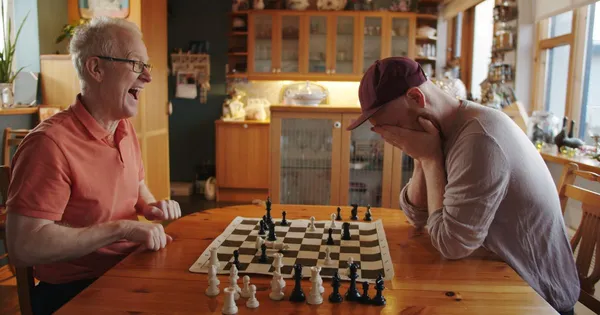 |
| The Home Game. Smari Gunn: 'We just started filming without kind of knowing what we were going to do with it. We had no money or anything. We just got filming' Photo: MetFilm |
Crowd-pleasing documentary The Home Game tells the uplifting story of how a football club in Iceland from Hellisandur, in Iceland, which has a population of less than 400, became determined to play a match on local turf in the country’s FA Cup. The idea was the brainchild of Viðar Gylfason but despite getting the pitch up and running his dream was scuppered by an away draw which saw his team Reynir FC lose spectacularly 10-0.
As 2020 rolls around, his son Kári Viðars becomes determined to realise his dad’s dream. The pitch is impressive but, even more so, the team spirit of a club which has an inclusive policy of accepting players no matter what their age, gender or ability. The film has its UK premiere at Glasgow Film Festival this week and we caught up with directors Smari Gunn and Logi Sigursveinsson to talk about how they “accidentally” came to work together and grappled with the tricky issue of shooting a documentary during the Covid pandemic.
The story originates in 1994, is it something you knew something about for a long time or did you come to it more recently
Smari Gunn: It's quite funny actually because I think it was a story locally and a story that was quite silenced by the community because of the embarrassment of what happened in 1996, when they lost against the golf club, we only really found out about this, when Kári Viðars, the main protagonist of the film, told us about this football pitch that they had in the middle of the lava field, and it had been standing there for 25 years, and no one's ever played on it. And he told us the reason why, which we found very funny. And he told us what he was going to do to get the team back together. We just started filming without kind of knowing what we were going to do with it. We had no money or anything. We just got filming.
Logi Sigursveinsson Yes, we just thought, “Oh, this is a great idea. I'm sure it will turn into something’’. But at that moment, we weren’t sure what that was going to be.
You seem to have been on board quite near the start of the second incarnation of the team - was it a bit of a hit and hope idea then, you’d just see what happened?
 |
| Smari Gunn and Logi Sigursveinsson. Smari: 'Kári contacted both of us separately. We didn't know each other before we started this project. So he put us together' |
Are either of you from the area?
LS: Yes, I’m from Ólafsvík, which is the town where the big football pitch is.
SG: He is from the rival town.
LS: I knew there was a team at some point. But the youth team had sort of merged with the team from Ólafsvík so I wasn't wasn't aware that there was ever a separate Reynir team, let alone the whole 10-0 game.
How easy was it to get the community on board to talk about this, given the 10-0 loss in the first place?
SG: I think what you will see from the film is that the people in town have got a great sense of humour for themselves and for their community. I think that's what really makes them such a lovable bunch of people. When we've been taking this film internationally, we weren't necessarily expecting it to work, but people somehow fall in love with these guys. And I think also with Kári and Viðar, because they’re big pillars of that society, if they say, “This is cool, we're doing this”, then everyone's like, “Okay, we're all doing it”. So people were super-welcoming and excited to take part.
Were you surprised by how driven Kári becomes about the match?
LS: Kári has been such an entrepreneur in the area, he always does these crazy projects and takes them all the way so I don't think anyone was surprised that he was this committed to this project.
SG: There were also stepping stones during the process, in terms of whether they would get this home game or not, whether they would actually get a team together. And I think there was some sort of lucky star over this project the whole time. That seemed to spur them on whenever there was a big positive. We were shooting this at a very difficult time for them, it was during Covid. But we made the decision to completely cut Covid out of our story, because we wanted to make a film that could stand the test of time and wouldn't remind people of this kind of sad existence that we had during those two or three years. You might be able to see one or two masks, like for a split second in the film but when we looked at all the material, we just saw this is a happy story and we didn’t want anything spoiling that.
The community is so strong. Were you surprised by how all-inclusive they were or do you think Iceland is more embracing of that idea anyway.
SG: I think I think the Icelandic countryside definitely is. I think people are more serious maybe in the city. We knew quite early on because one of the first things we did was a two-hour long interview with Viðar. He told us everything from 1994, and how when he coached the kids, he wanted everyone to take part. That was the ethos of the team. I’m from a similar town in the West Fjords and we had the same thing. We had three girls on my team just so we could make up the number so we could compete.
I feel like small towns often get a bad reputation for being quite discriminatory. But I also come from the countryside and the reverse can be true, because you have a small population and if you want to do something, basically you have to include everybody.
SG: Yeah, so you kind of forced to include everybody and that kind of becomes your culture. And if that's what you grow up with, that's all you know. So it was really interesting for us that they had Freydís Bjarnadóttir [a female member of the team]. Because Kári was insistent that he would do things like his dad did because his dad is his biggest role model. He wanted to do it exactly like him except not lose 10-nil. So I think it was just, it was just a really nice surprise that Freydís was one of those girls who used to play with them. She carried and played in the Icelandic top division.
She got on the bench for one national team match. She was 39 or something when we were shootign the film but she's an incredible footballer, and she holds her own. So I think, yeah, I think the aspect of Freydís joining this team and her playing a big part on game day not just makes you feel good but also I think it's quite timely. Especially here in the UK, where there has been, I think, very sad conversations with male football players talking about female pundits and saying they shouldn't be talking about the men's game because they haven't played the men's game. So I think it's actually really nice that we've got this film here where a woman comes in and plays the man's game and holds her own.
Did shooting during the pandemic present challenges, because particularly with a documentary like this you need to get up close and personal with people?
SG: We also had another issue, which is I'm based in the UK, so traveling also became a big problem. We had to do a lot of remote working. It helped that it was in the Snaefellsnes Peninsula, because they are quite secluded and didn't have that many outbreaks. And we had a very stripped down crew, and obviously followed all the guidelines tha twe could. We also tried to shoot quite a lot outside and iin Snaefellsnes you can almost point the camera anywhere and you've got a beautiful background, a glacier or something.
So was it you who first came across the idea, Logi, because you were still in Iceland?
SG: Kári contacted both of us separately. We didn't know each other before we started this project. So he put us together.
How was it to establish a working relationship, particularly with one of you in the country and one out of it.
LS: It was interesting because neither of us had made a feature film before and I'd only done one documentary by myself. So everything was kind of new for us, so we just kind of went with it and adapted to the situation.
SG: We just somehow hit the ground running. And I think because in the first instance, we had to do things remotely, because I was stuck in the UK. So we would just like working together like over Zoom. I would do a lot of write ups and questions and stuff, and Logi would go.
 |
| Viðar and Kári in The Home Game. Smari Gunn on the pair: 'if they say, “This is cool, we're doing this”, then everyone's like, “Okay, we're all doing it”.' Photo: MetFilm |
So we kind of started in a way where I was bossing him around. And then when I could go and we could do things together, then we kind of merged into one. I think the beauty of me and Logi actually is that I am a huge football fan and Logi doesn't really care for it. So I think that's what really made our film meet in the middle somewhere. One of the best compliments you get about the film is from people that don't like football, but they say that they really enjoyed the film. It’s not a football film, it’s a human interest story disguised as a football film.
LS: That was always really important for me, because I don't really follow football. So I had the mindset of, if I liked the film, then other people who are like me, probably would too.
Is Reynir FC an ongoing project? Yes, it’s ongoing. They put the team together just to play this one game just to make a point and honour Viðar in the town and they're still going three or four seasons later. They're in the bottom division and Iceland, I think they're pretty bad, but they're still enjoying it. I mean, what it was all about is that they get together a few times a week and everyone's allowed to play and just have fun with football.
Football is not really the emphasis of this film.
SG: No, it’s more camaraderie and unity and just being good friends. I think that's kind of the main thing.
Are you planning to work together again and do you have any future projects in mind?
SG: I would love to. We haven't really figured out any projects yet but I think we work well together. So I think it would be a good idea for us. And people have been asking us as well, like, what's the next documentary? And because neither of us have made the documentary before, we never considered ourselves as documentary filmmakers. And we might have to kind of keep an eye out for the next story that would be suitable.
LS: Yes, exactly.
The Home Game screens at Glasgow Film Festival on Wednesday, March 6 at 6pm, attended by the directors, and on Thursday, March 7 at 1.15pm - tickets available here





















